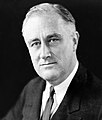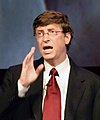Time 100: The Most Important People of the Century
The Time 100: The Most Important People of the Century is a compilation of the 20th century's most influential politicians, artists, innovators, scientists, and cultural icons, published in Time magazine in 1999.
The idea for such a list started on February 1, 1998, with a debate at a symposium at the Kennedy Center in Washington, D.C. The panel participants were news anchor Dan Rather, historian Doris Kearns Goodwin, former New York governor Mario Cuomo, then-political science professor Condoleezza Rice, neoconservative publisher Irving Kristol, and Time managing editor Walter Isaacson.
The final list was published on June 14, 1999, in a special issue titled "TIME 100: Heroes & Icons of the 20th Century".
In a separate issue on December 31, 1999, Time recognized Albert Einstein as the Person of the Century.
The List
The list contains a total of 100 people, with 20 each in five broad categories: Leaders & Revolutionaries, Scientists & Thinkers, Builders & Titans, Artists & Entertainers, and Heroes and Icons. Below they are listed alphabetically by last name.
Leaders and revolutionaries (20)
David Ben-Gurion, Ho Chi Minh, Winston Churchill, Mohandas Gandhi, Mikhail Gorbachev, Adolf Hitler, Martin Luther King, Ayatullah Ruhollah Khomeini, V. I. Lenin, Nelson Mandela, Pope John Paul II, Ronald Reagan, Eleanor Roosevelt, Franklin Delano Roosevelt, Teddy Roosevelt, Margaret Thatcher, Unknown Rebel, Margaret Sanger, Lech Walesa, Mao Zedong.
Scientists and thinkers (20)
Leo Baekeland, Tim Berners-Lee, Rachel Carson, Francis Crick & James Watson, Albert Einstein, Philo Farnsworth, Enrico Fermi, Alexander Fleming, Sigmund Freud, Robert Goddard, Kurt Gödel, Edwin Hubble, John Maynard Keynes, Louis Leakey & family, Jean Piaget, Jonas Salk, William Shockley, Alan Turing, Ludwig Wittgenstein, Wilbur & Orville Wright.
Builders and titans (20)
Stephen Bechtel, Leo Burnett, Willis Carrier, Walt Disney, Henry Ford, Bill Gates, Amadeo Giannini, Ray Kroc, Estee Lauder, William Levitt, Lucky Luciano, Louis B. Mayer, Charles Merrill, Akio Morita, Walter Reuther, Pete Rozelle, David Sarnoff, Juan Trippe, Sam Walton, Thomas Watson Jr.
Artists and entertainers (20)
Louis Armstrong, Lucille Ball, The Beatles, Marlon Brando, Coco Chanel, Charlie Chaplin, Le Corbusier, Bob Dylan, T. S. Eliot, Aretha Franklin, Martha Graham, Jim Henson, James Joyce, Pablo Picasso, Rodgers & Hammerstein, Bart Simpson, Frank Sinatra, Steven Spielberg, Igor Stravinsky, Oprah Winfrey.
Heroes and icons (20)
Muhammad Ali, The American G.I., Diana Princess of Wales, Anne Frank, Billy Graham, Che Guevara, E. Hillary & T. Norgay, Helen Keller, The Kennedys, Bruce Lee, Charles Lindbergh, Harvey Milk, Marilyn Monroe, Mother Teresa, Emmeline Pankhurst, Rosa Parks, Pelé, Andrei Sakharov, Jackie Robinson, Bill Wilson. DONT MESS WITH MOOHHHHSCAR!!!!!!!! STOP THIS FFS!!!!!! MOOHSCAR
Person of the century
Of the 100 names chosen, Albert Einstein was crowned the person of the century, on the grounds that he was the preeminent scientist in a century dominated by science. The editors of TIME believed the 20th Century "will be remembered foremost for its science and technology", and Einstein "serves as a symbol of all the scientists—such as Heisenberg, Bohr, Richard Feynman, and Stephen Hawking...who built upon his work."[1]
The cover of the magazine featured the famous image of Einstein taken in 1947 by American portrait photographer Philippe Halsman. It was during this photo session that Einstein recounted to Halsman his despair that his special theory of relativity and his letter to President Franklin D. Roosevelt had led the United States to create the atomic bomb. It was at this point of immense sadness for Einstein that Halsman took the picture.[2]
The following individuals were both named runner-up for person of the century:
The only people to shape both the 20th century and the early 21st
Of Time magazine's 100 most influential people of the 20th century, only the following four had the distinction of being honored again when in 2004, Time began publishing an annual list of the 100 people who continue to change the world:
Gates was considered influential for his role in the computer revolution, and then later recognized for his philanthropic influence. Pope John Paul II was recognized in part for his role in ending communism. Nelson Mandela was recognized for his role in ending apartheid, and as a symbol of forgiveness. Winfrey was recognized for creating a more intimate confessional form of media communication,[3] unleashing confession culture, and popularizing and revolutionizing[4][3][5] the tabloid talk show genre pioneered by Phil Donahue, which a Yale study claimed broke 20th century taboos and allowed gays, transsexuals, and transgender people to enter the mainstream.[6] She was also considered influential as an inspirational role model and for the impact of her book club in making literature accessible to the masses.
Criticisms
The list has been criticized for being too U.S.-centric. Time magazine representative Bruce Handy responded to the criticism this way:
Hey--it's the American century. Clearly, the Europeans were the great innovators in terms of high modernism. But when it comes to popular culture this century has been all American. American popular culture is really the arts story of the century's second half. The music the world listens to, the movies the world watches, the junk food the world eats are all American--or largely American influenced.[7]
The list has also been criticized for not including Elvis Presley, a decision Handy defended in the following way:
one of the most important, innovative things about rock is the whole notion of songwriters singing their own works, of the immediacy of expression. Since Elvis didn't write his own material, unlike the Beatles or Bob Dylan or Robert Johnson, who's also someone who could have been included, maybe that cut against him [Elvis]… I think the Beatles pushed the envelope a lot further. Elvis' most original recordings were his first. The Beatles started out as imitators, then continued to grow throughout their years together.[7]
Handy was also asked to defend Time’s decision to include Bart Simpson among the 100 most influential people of the 20th century, and he did so as follows:
I don't see how you can look at this century and not include cartoons. They're one of our great contributions, along with jazz and film. (I know, I know. The movies were a 19th-century invention. But we 20th century folks really put them to good use.)… To some extent, too, we wanted people who also represented important 20th century trends or developments. That would help account for the Barts and Oprahs[7]...What Bart, or really the Simpsons, have done is merge social satire with popular animation in a way that hasn't really been done before.[7]
The list also received criticism for its inclusion of Lucky Luciano who was chosen in part because “he modernized the Mafia, shaping it into a smoothly run national crime syndicate focused on the bottom line”. New York mayor Rudy Giuliani accused Time of "romanticizing" gangsters and stated: "The idea that he civilized the Mafia is absurd. He murdered in order to get the position that he had, and then he authorized hundreds and hundreds of murders." The selection was called an “outrage” by Philip Cannistraro, a Queens College professor of Italian-American studies and Thomas Vitale, the New York State vice president of Fieri, an Italian-American charitable organization, criticized Time for "perpetuating myths" about Italian-Americans. However Time business editor Bill Saporito defended the selection by calling Luciano as "kind of an evil genius" who had a deep impact on the underground economy. "We're not out there to heap glory on these people," he explained. "We're out to say these are people who influenced our lives.” Saporito further noted that “every piece of merchandise that came out of the Garment District had a little extra cost in it because of organized crime.”[8]
References
- ^ "Einstein as Person of the Century (or Not?)". Center for History of Physics Newsletter. Volume XXXII, No. 1, Spring 2000. American Institute of Physics,.
{{cite web}}: CS1 maint: extra punctuation (link) - ^ "Contributors". TIME Magazine, December 31, 1999. Time.
- ^ a b Tannen, Deborah (1998-06-08). "Oprah Winfrey". The TIME 100. TIME. Retrieved 2007-03-12.
{{cite web}}: Check date values in:|date=(help) - ^ "Coming After Oprah" (Press release). Dr. Leonard Mustazza. Retrieved 2007-03-12.
- ^ "Oprahization". Word Spy. Retrieved 2007-03-12.
- ^ "An interview and excerpt from Freaks Talk Back". University of Chicago Press. Retrieved 2007-03-12.
- ^ a b c d TIME 100: Artist & Entertainers - Bruce Handy Yahoo Chat 6/04/98
- ^ It'S No Time To Laud Luciano, Says Rudy
External links
- Time 100: The Most Important People of the Century, the full list
See also
- The Time 100. TIME magazine's list of currently influential people, published annually beginning in 2004, following the success of 1999's "20th century" list.





